WHFI HEARD ON MOTOR CITY RADIO FLASHBACKS
WHFI-FM * IRA J. COOK * 1969
![]()
 From the MCRFB news archive: 1970
From the MCRFB news archive: 1970
Meeks Enters Third Decade Providing PAMS Jingles Service . . . And More
DALLAS — Nearly twenty-years ago Bill Meeks thought up the name PAMS for a banking client. A short time later the bank gave it back to him. PAMS then became the name of Meek’s new company, one which would revolutionize the commercial jingle and station industry.
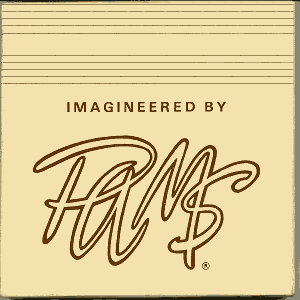 PAMS means Production-Advertising-Merchandising-Service. To Meeks and his companions, it means a great deal more. Not only is it the largest company of its kind in the world (more than 1,000 clients), but it has been a salvation to the music industry in Dallas.
PAMS means Production-Advertising-Merchandising-Service. To Meeks and his companions, it means a great deal more. Not only is it the largest company of its kind in the world (more than 1,000 clients), but it has been a salvation to the music industry in Dallas.
It was on March 8, 1951, when it all started. Bill Meeks was a musician — a saxophone player — who worked in a staff band for WFAA, and then for KLIF, when Gordon McClendon put it on the air in 1947.
It was here that Meeks invented the concept of musical station breaks. He was the contractor for the station, and he sort of “put things together.” Leaving his saxophone (plus clarinet and flute) behind him, he went into time sales. He sold many accounts, began to form a good relationship with his clients, and then — inevitably — formed his own agency. That’s when he invented the PAMS name, only to have it given back. It would be the greatest bit of Indian giving in musical history.
Meeks began his musical jingles with a syndicated series, “We put a man on the road, cut the background music and sang the call letters over the music, customizing for each city,” he said.
The jingle impresario said he immediately began to check with the Union to be sure we were on safe ground. “As an old Union musician, I wanted to be sure. Petrillo told us to do our own thing in Dallas, whatever we thought best. He told us to ignore the rule that said the voice and sound must be done at the same time, so we did.” That rule of course, has since been changed. And Dallas has always continued to do its own thing, despite some pressure from unions in other cities.
PAMS had about 12 or 13 jingles in its first series, and 23 in its second. Series 3 was a disk jockey introduction. Series 4 was the first variable length station ID. Series 5 was a group of merchant jingles cut for Chevrolet dealers, and made available to the entire United States.
It was Meek’s first big commercial success.
Series 6 was a new sound, using a group called the Moonmaids. On and on it went; rhythm and blues on one, a top 40 sound on another, all-male groups, all-female groups, mixed groups, mixed groups, station signatures, music logos, a living radio series, high school fight songs (done on location), sounds of the cities (with seasonal backgrounds), a New Frontier series, and then a pair of Sonovox series, with talking guitars, flutes, trombones, etc.
There were weather-ettes, “sonomagic and animajic” His and Hers Radio, an All-American series, a Jet Set thing utilizing “iconagentics,” a go-go series, pussycat, swisle, music power, the new generation, and modules.
Right now Meeks and his associates are working on Series 41, which hasn’t yet been named. Musical contests are being put together at this time.
Basic Staff
All of this, of course, has required not only great musicianship, but the ability of singers to sight read, to innovate, to adopt a mood at once, and to perform anytime of night or night.
“Through the years we have maintained a basic staff,” Meeks said, but we always brought in outside musicians when we need them. Among them has been such guitar players as Glen Campbell. We could name many other big ones.”
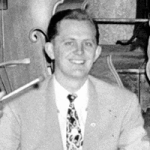
Bill Meeks is president of the company, and his wife, Majorie, is vice-president. Another vice-president is Clifford Moore. Toby Arnold, a ten-year veteran with the firm, is sales manager, and has a working knowledge of viratually every radio operation in America. Bob Piper is musical director and Marvin Show is an arranger-producer. Ray Hurst is a creative writer and producer, and Jim Kirk is a writer-producer-musician-singer. There are two engineers and mixers. Bruce Collier, chief engineer, is regarded one of the finest in his field. He is ably aided by Bob Peepols.
Alan Box works in editing, and Gloria Watkins is a friendly, attractive, capable singer, writer, musician. Jim Clancy is a singer, and there are two lead girl singers (unusual in itself) in Carol Piper and Jackie Dixon. Jack Peters is another writer-arranger-musician.
Only people who believe in being a full part of the staff work for PAMS. All are on a guaranteed staff salary, and some of those salaries are extremely high even by Texas standards.
“There are many advantages in having our own people,”Meeks said. “First of all, they’re an integral part of the organization and they are loyal. They work well together. And when we play an audition for a client he knows exactly what the master will sound like.”
PAMS does sound tracks for films, and does many commercials but station ID’s constitute about 80 per cent of the business. Yet, Meeks estimates that 50 per cent of all jingles done in Dallas comes from the PAMS studios. There are three studios in all.
To make his point emphatic about bringing in musicians when he needs them, Meeks points out that PAMS has spent $110,000 on outside talent through the first nine months of this year.
Meeks began his company modestly. Originally he had a couple of Ampex machines, with no equalization equipment, no echo-chamber. Now, with three studios, he has a complete operation. His newest board, a Neuman, was custom-made in Germany with 10 and 16 tracks. His American board is an Electrodyne. He has his own Moog.
The newest studio is for privacy, for creativity. Its doors are locked, with keys held only by the staff talent. It has a telephone, but the number is unlisted. This is where creative production is done.
“We serve as production arm to radio stations,” Meeks said. “We give them complete service; we owe it to them.” This close relationship is attested to by the fact that the clients, now above the 1,000 mark, keep climbing.
Dallas is attracting new talent, according to Meeks. “We used to have to shuffle around to find people, but now they come in to audition. And they’re coming in droves from such places as New York and Los Angeles. They know it’s happening in Texas.’
PAMS now is scoring many films — and it has the talented musicians to get the job done. This is being done by both American and Canadian companies.
And what is next? “I’ve been thinking for a long time about the record business,” Meeks said. “All of us have been talking about it, and we jus might involve ourselves in records.”
And why not, with 1,000 satisfied radio stations already customers. END
(Information and news source: Billboard; November 21, 1970).
![]()
![]()
![]()
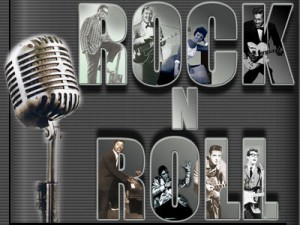 From the MCRFB music calendar:
From the MCRFB music calendar:
Events on this date: NOVEMBER 2
1956: A riot breaks out at a Fats Domino show event at Fayetteville, NC, with police resorting to tear gas to break up the unruly crowd. Fats jumps out of a window from the building in which the show was being held to avoid the melee; during his escape, he and two other band members were injured in the process.
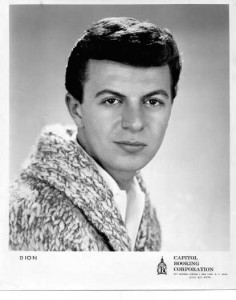
1963: Dion (formerly of the Belmonts) angrily walks off the ITV television program Ready Steady Go! in the middle of performing his hit, “Donna, The Prima Donna,” claiming the go-go dancers surrounding him during his song were distracting.
1963: Reviewing the Beatles’ concert the night before in Cheltenham, England, the British paper Daily Mirror uses the headline Beatlemania! effectively inserting the phrase into the popular consciousness for the first time.
1964: Brenda Lee gives a Royal Command Performance for Queen Elizabeth II in London, along with Cliff Richard and Cilla Black.
1966: Paul Revere and the Raiders appear on tonight’s “Dizzoner The Penguin” episode of ABC-TV’s Batman.
1968: Cream is presented with a platinum album for Wheels Of Fire at the Madison Square Garden stop of their farewell tour.
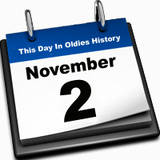 1969: The Rolling Stones quasi-documentary Sympathy For The Devil, directed by Jean-Duc Godard, premiers in San Francisco.
1969: The Rolling Stones quasi-documentary Sympathy For The Devil, directed by Jean-Duc Godard, premiers in San Francisco.
1974: George Harrison begins the first-ever solo tour by a Beatle when he performs the first night of his Dark Horse Tour in Vancouver, BC. The tour, which is plagued by Harrison’s laryngitis, is a disaster.
1979: The British rock band Who debuts their film Quadrophenia in theaters across the U. S., featuring relatively a small part in the movie by Sting.
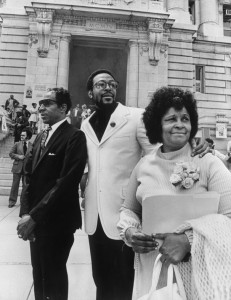
1984: Marvin Gay, Sr., father of Motown great Marvin Gaye (who added the e when he signed with Motown) is found guilty of manslaughter in the shooting death of his son, but courts rule the shooting was in self-defense, and the elder Gay is given five years’ probation.
1985: With his new single, “Part-Time Lover” topping the charts, Stevie Wonder becomes the artist with the longest period between Number Ones: 22 years. “Part-Time Lover” also sets a record by going to Number One on five different Billboard charts.
1994: Crosby, Stills, Nash and Young’s David Crosby is hospitalized after suffering liver failure; he’s fortunate to find a donor for a transplant.
1995: The syndicated R&B dance show Soul Train celebrates its 25th year on the air with guests appearances by Al Green, Diana Ross, Bill Withers and Patti Labelle.
 Releases: 1963: “Be True To Your School,” Beach Boys. 1968: “For Once In My Life,” Stevie Wonder. 1971: ‘Bob Dylan’s Greatest Hits Volume 2,’ Bob Dylan.
Releases: 1963: “Be True To Your School,” Beach Boys. 1968: “For Once In My Life,” Stevie Wonder. 1971: ‘Bob Dylan’s Greatest Hits Volume 2,’ Bob Dylan.
Recording: 1967: “Hello Goodbye,” Beatles. 1973: “Never say Goodbye,” Bob Dylan.
Charts: 1955: “Sixteen Tons,” Tennessee Ernie Ford, enters the charts. 1955: “Cry Me A River,” Julie London, enters the charts. 1963: ‘In The Wind,’ (LP) Peter Paul and Mary, hits No. 1 on the LP charts. 1974: “You Haven’t Done Nothin’,” Stevie Wonder, hits No. 1 on the charts. 1974: “Play Something Sweet (Brickyard Blues),” Three Dog Night, enters the charts on this date. 1974: ‘So Far,’ (LP) Crosby, Stills, Nash and Young, hit No. 1 on the LP charts.
And that’s just a few of the events which took place in pop music history NOVEMBER 2
![]()